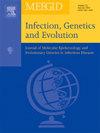The impact of infections and genetics on secondary sex ratio
IF 2.6
4区 医学
Q3 INFECTIOUS DISEASES
引用次数: 0
Abstract
The secondary sex ratio (SSR), which reflects the proportion of male to female offspring at birth, is influenced by a complex interplay of multiple factors. This review delves into the current understanding of how infections and genetics contribute to variations in the SSR. The effects of infections on the SSR represent an intriguing intersection of biology and epidemiology. Research indicates that several infectious diseases, such as toxoplasmosis, coronavirus disease 2019, Spanish flu, acquired immunodeficiency syndrome and tuberculosis, can impact the SSR through mechanisms that are only partially understood. Genetics are also scrutinized in this review. Although their involvement in determining the SSR is debatable, various genetic factors have been studied. The influences of the Rhesus D heterozygous phenotype, major histocompatibility complex, corticosteroid-binding globulin deficiency, ethnicity, and consanguinity on SSR have been delineated. By amalgamating findings from diverse disciplines, this review aims to offer a comprehensive overview of the multifaceted impact of infections and genetics on SSR, pinpointing potential implications for reproductive biology and public health.
感染和遗传对第二性比的影响
第二性比(secondary sex ratio, SSR)是多种因素复杂相互作用的结果,反映了出生时雄性后代与雌性后代的比例。这篇综述深入到目前的理解如何感染和遗传有助于变异SSR。感染对SSR的影响代表了生物学和流行病学的一个有趣的交集。研究表明,几种传染病,如弓形虫病、2019冠状病毒病、西班牙流感、获得性免疫缺陷综合征和结核病,可以通过仅部分了解的机制影响SSR。遗传学也在这篇综述中被仔细审查。虽然他们参与确定SSR是有争议的,各种遗传因素已经研究。分析了猕猴D杂合表型、主要组织相容性复合体、皮质类固醇结合球蛋白缺乏、种族和亲缘关系对SSR的影响。通过整合不同学科的研究成果,本综述旨在全面概述感染和遗传学对SSR的多方面影响,并指出其对生殖生物学和公共卫生的潜在影响。
本文章由计算机程序翻译,如有差异,请以英文原文为准。
求助全文
约1分钟内获得全文
求助全文
来源期刊

Infection Genetics and Evolution
医学-传染病学
CiteScore
8.40
自引率
0.00%
发文量
215
审稿时长
82 days
期刊介绍:
(aka Journal of Molecular Epidemiology and Evolutionary Genetics of Infectious Diseases -- MEEGID)
Infectious diseases constitute one of the main challenges to medical science in the coming century. The impressive development of molecular megatechnologies and of bioinformatics have greatly increased our knowledge of the evolution, transmission and pathogenicity of infectious diseases. Research has shown that host susceptibility to many infectious diseases has a genetic basis. Furthermore, much is now known on the molecular epidemiology, evolution and virulence of pathogenic agents, as well as their resistance to drugs, vaccines, and antibiotics. Equally, research on the genetics of disease vectors has greatly improved our understanding of their systematics, has increased our capacity to identify target populations for control or intervention, and has provided detailed information on the mechanisms of insecticide resistance.
However, the genetics and evolutionary biology of hosts, pathogens and vectors have tended to develop as three separate fields of research. This artificial compartmentalisation is of concern due to our growing appreciation of the strong co-evolutionary interactions among hosts, pathogens and vectors.
Infection, Genetics and Evolution and its companion congress [MEEGID](http://www.meegidconference.com/) (for Molecular Epidemiology and Evolutionary Genetics of Infectious Diseases) are the main forum acting for the cross-fertilization between evolutionary science and biomedical research on infectious diseases.
Infection, Genetics and Evolution is the only journal that welcomes articles dealing with the genetics and evolutionary biology of hosts, pathogens and vectors, and coevolution processes among them in relation to infection and disease manifestation. All infectious models enter the scope of the journal, including pathogens of humans, animals and plants, either parasites, fungi, bacteria, viruses or prions. The journal welcomes articles dealing with genetics, population genetics, genomics, postgenomics, gene expression, evolutionary biology, population dynamics, mathematical modeling and bioinformatics. We also provide many author benefits, such as free PDFs, a liberal copyright policy, special discounts on Elsevier publications and much more. Please click here for more information on our author services .
 求助内容:
求助内容: 应助结果提醒方式:
应助结果提醒方式:


